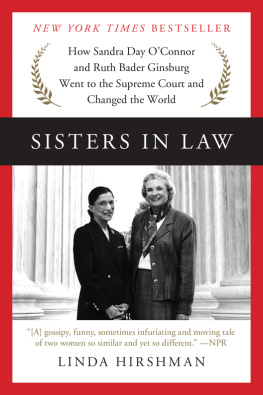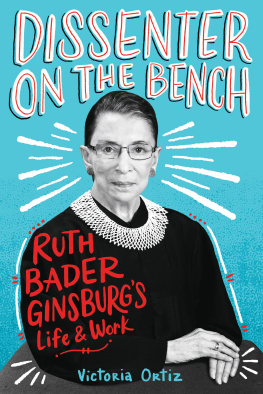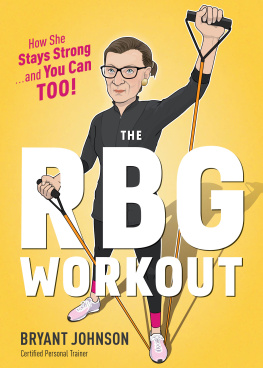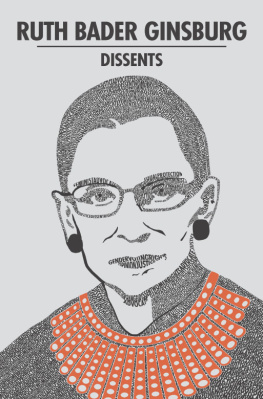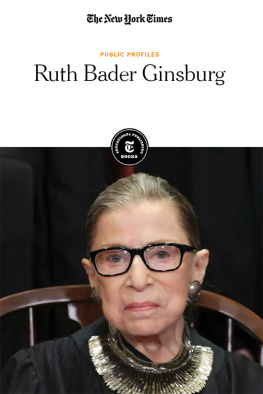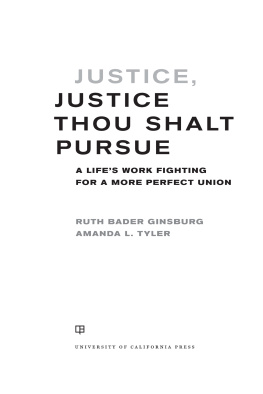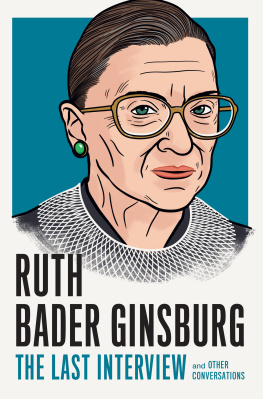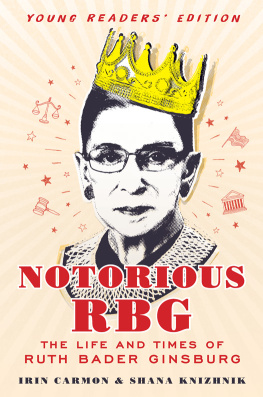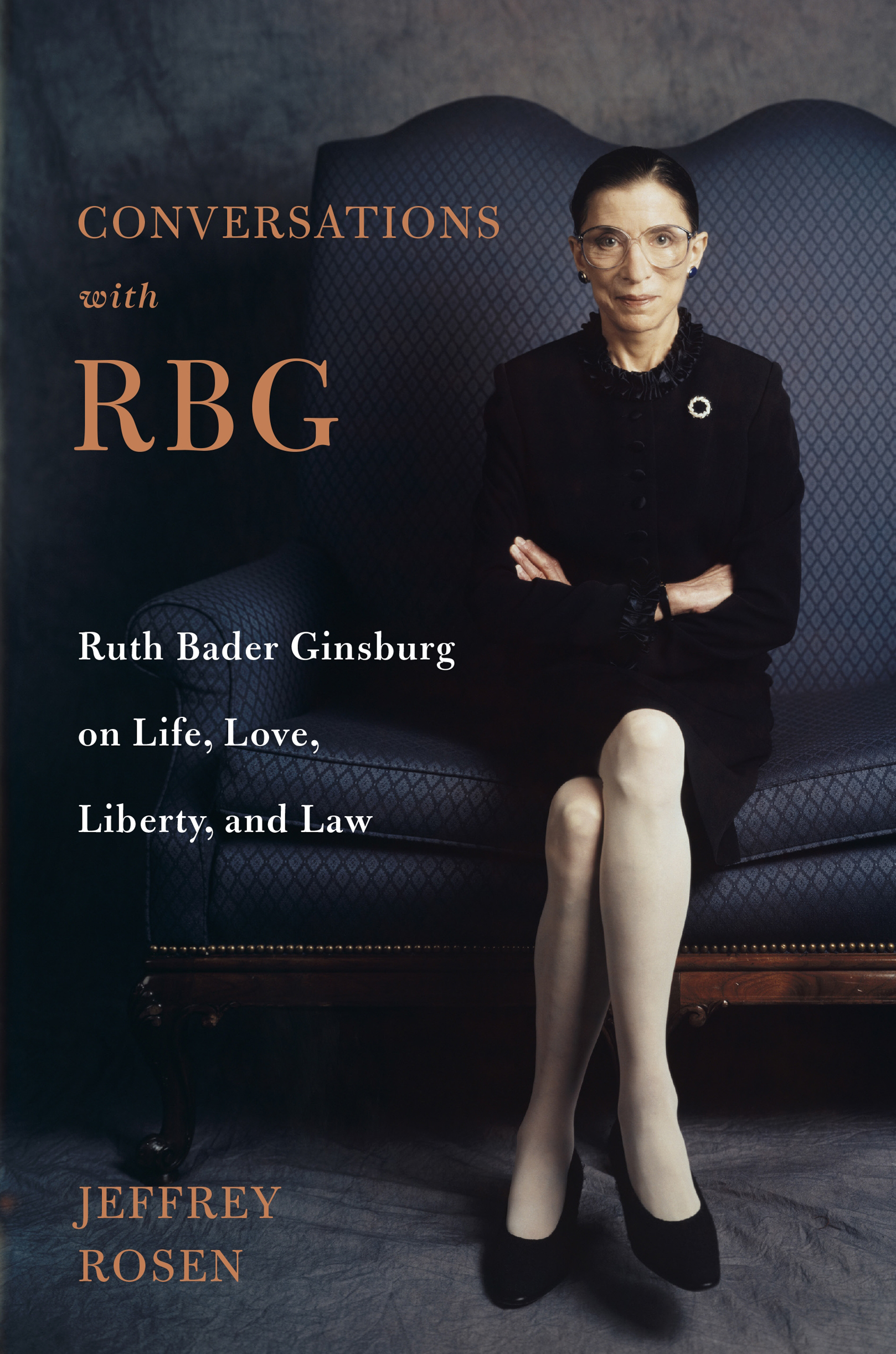The author and publisher have provided this e-book to you for your personal use only. You may not make this e-book publicly available in any way. Copyright infringement is against the law. If you believe the copy of this e-book you are reading infringes on the authors copyright, please notify the publisher at: us.macmillanusa.com/piracy.
One of the luckiest relationships of my life began with a chance encounter in an elevator. I first met Ruth Bader Ginsburg in 1991, when I was a young law clerk on the U.S. Court of Appeals for the District of Columbia Circuit. She was a judge on the same court, and I ran into her as she was on her way back from a workout class called Jazzercize. She was a formidable presence, and as we rode the elevator, she maintained the sphinxlike silence that those who dont know her can mistake for remoteness.
To break the ice, and unable to think of anything else to say, I asked her which operas she had seen recently. I dont think I knew she was an opera fan, but it seemed like a safe topic. We bonded immediately over our mutual love of opera and began a conversation about music that has continued ever since.
A year later, I was hired to be the legal affairs editor of the New Republic. This was another lucky break: at the age of twenty-eight, I had fallen into my dream job, writing about the law and the Supreme Court for a Washington magazine whose legal writers had included constitutional legends such as Learned Hand, Felix Frankfurter, and Alexander Bickel. Ginsburg and I began corresponding about my first New Republic articles and about the latest operas she had seen. When I sent her a piece after the 1992 presidential election arguing that Justice Antonin Scalia had become the Leader of the Opposition to an incoming Democratic president and Congress, she replied diplomatically, Interesting article about my friend, the Justice. A few weeks later, on January 21, 1993, in response to an article about a lackluster performance of Otello at the Washington National Opera, she wrote:
Hope you and a friend are free to attend the Wednesday, February 17 Turandot rehearsal. No forecast about the performance, but seats are up front on the aisle The other opera this fall was the Tsars Bride. I wish you had attended that one instead of Otello. It might have prompted kinder thoughts about the Washington opera.
After I attended the Turandot rehearsal and thanked her for the tickets, she saw the opening performance and shared her thoughts in a letter dated February 25: Turandot was grand opera. The chorus, especially in the first act, was spectacular in the performance I attended last night. Diva Eva sang in a very full voice and the Calaf did a better job than I expected with Nessun Dorma. Glad you had a chance to see the local company in brighter light and more comfortable seats.
In the same letter, she also responded to an article Id sent praising Justice David H. Souter but criticizing the cult of Harlan that had developed around the justice he had invoked as his hero, Justice John Marshall Harlan II, a moderate conservative justice from the Warren era whom both liberals and conservatives on the Court were embracing as a model of judicial restraint.
Enjoyed your comment on Justice Souter, but think you give Justice Harlan less credit than he merits. Gerry Gunther, my dear teacher and friend, has the highest regard for Harlan, because he almost always gave us a full accounting for his position, without guise or fanfare. A typical example is his concurring opinion in Welsh v. United States, which proved a great aid to me in my equal rights advocacy days.
Ginsburgs citation of the Welsh case, from 1970, showed her strategic vision as an advocate as well as her respect for Harlans transparency as a judge. In that opinion, Harlan had held that the remedy for a constitutional violation is either extension or invalidation: in other words, if a court concludes that a law violates the Constitution by discriminating in favor of a particular group, it can either invalidate the discriminatory law in question or extend its benefits to the excluded class. Ginsburg invoked Harlans opinion in Welsh in a 1979 law review article called Some Thoughts on Judicial Authority to Repair Unconstitutional Legislation, where she explained that the Welsh opinion had inspired her as an advocate to ask the Supreme Court to extend Social Security and public assistance benefits to both men and women in cases where one or the other gender had been excluded because of discriminatory stereotypes. The Welsh case also informed her strategy in the first gender equality case she won, Moritz v. Commissioner of Internal Revenue, now immortalized in the 2018 movie On the Basis of Sex. In Moritz, she successfully persuaded a federal appellate court to extend a tax benefit that had previously been available only to single women who cared for their dependent parents to single men in the same situation.
Emboldened by this friendly correspondence, I sent Judge Ginsburg flowers for her sixtieth birthday on March 15 and she responded three days later with a handwritten card: The flowers now brighten the first sitting of my 60s and will help me think of spring this weekend. She added that she had just seen a dress rehearsal for Janaceks Cunning Little Vixen: Three puntas to me for not asking you to join my chambers team for the Vixen Look-In Washington Opera did March 10 at noon. With appreciation, RBG.
On March 20, Justice Byron R. White retired from the Supreme Court. Ginsburg was one of several candidates being considered to replace him, but her nomination was opposed by some womens groups who viewed her as insufficiently liberal because she had criticized the legal reasoning in the Courts landmark abortion rights decision, Roe v. Wade.
In late April I wrote a piece for the New Republic called The List, ranking the seven leading candidates in ascending order and concluding with Ginsburg. Of all the candidates on President Bill Clintons short list, I wrote, Ginsburg is the most respected both by liberals and conservatives.
Her scrupulous position on Roe represents Clintons best opportunity to cut the Gordian knot of the litmus test; and she is the candidate most likely to win over the swing justices in memos and at conference. The only concern about Ginsburg is that she might become too friendly with the mushy middle. But although she has been willing to compromise on minor details, her core positionson broad access to the courts, freedom of religion and speech and gender equalityare models of principled liberalism. Her nomination would be one of the most acclaimed since Felix Frankfurter, who turned Ginsburg down for a clerkship in 1960 on the grounds that he wasnt ready for a woman. Now, we are.
A few weeks earlier, although I didnt know it at the time, Marty Ginsburg, the judges husband, had begun a quiet campaign to convince Senator Daniel Patrick Moynihan of New York to champion her nomination. (Moynihan, initially skeptical, came to relish the chance to take on his colleague Senator Edward Kennedy of Massachusetts, who was supporting the candidacy of a hometown federal appeals court judge, Stephen G. Breyer, who sat in Boston.) I surely saw your editorials and had them in mind when I first spoke to the President, Moynihan wrote to me on June 21, 1993. On the other hand, there appears no question that by the beginning of the week of June 8th, the President had narrowed the choices down to three candidates: Judge Breyer, Judge [Gilbert] Merritt, and Secretary [of the Interior Bruce] Babbitt. Then, of a sudden, Judge Ginsburg reappeared.


